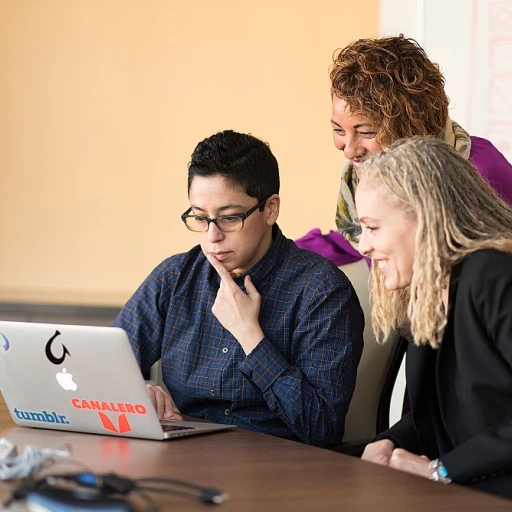
Understanding the Need for Alternatives
The Shift from Traditional Classrooms
The digital landscape has deeply impacted the way professional mentoring is conducted. Many mentors and mentees are moving beyond traditional tools, exploring alternatives to Google Classroom for a more personalized learning experience. As remote work becomes more prevalent, the need for robust online mentoring platforms is increasingly essential. While Google Classroom has been a staple in educational settings, its limitations in the professional realm are prompting a search for more versatile solutions.
The Growing Demand for Specialized Features
As professional environments evolve, the demand for tools that support specialized learning experiences is growing. Students and teachers seek features that enhance real-time interaction, content management, and course creation. Platforms like Canvas LMS and Microsoft Teams offer tools tailored to professional mentoring, providing support for varied learning styles, whether through online or face-to-face sessions.
Addressing Diverse Learning Needs
The push for alternatives is partly driven by the need for personalized learning experiences that cater to diverse professional requirements. Open source and classroom alternative platforms allow mentors to customize their materials, leading to more effective training sessions. Incorporating management systems and third-party tools into these platforms ensures a fluid integration with existing infrastructure, such as Google Workspace and Google Drive.
Economic Considerations and Accessibility
- Free and cost-effective solutions appeal to organizations with limited budgets.
- Open-source platforms offer customization without hefty price tags, making them an attractive choice.
- Accessibility features ensure that learners from all backgrounds can benefit, regardless of their technological capabilities.
Transitioning to new platforms presents its challenges, yet the benefits of improved learning experiences make the effort worthwhile. Real-time collaboration, efficient management systems, and adaptable content can significantly elevate professional mentoring programs.
Key Features to Look for in Mentoring Platforms
Identifying Essential Functionalities
When considering alternatives to traditional systems like Google Classroom for professional mentoring, certain features become fundamental to cater to both mentors and mentees effectively. These features ensure a seamless learning experience and optimize the use of mentoring platforms for learning and development.
Support for Diverse Learning Modalities
A comprehensive platform should allow for both synchronous and asynchronous learning experiences. Real-time communication tools enable live interactions between mentors and mentees, which can be found in options like Microsoft Teams. On the other hand, asynchronous tools such as recorded video lectures and discussion boards—widely supported by Canvas LMS and Brightspace—allow mentees to learn at their own pace, crafting a personalized learning journey.
Integration with Current Systems
The ability to integrate with existing tools, such as Google Workspace or third-party resources like Google Drive, is crucial. This ensures that teachers and students can easily access and manage learning content without constantly switching between different systems, enhancing overall course management.
User-Friendly Interface
An intuitive and easy-to-use interface is paramount. Platforms that cater to professional mentoring need to prioritize user experience to avoid time wasted on learning how to operate the system. This is especially important in distinguishing an ideal classroom alternative from a cumbersome platform.
Security and Privacy Protection
With the rise of online based learning, ensuring security and privacy is more essential than ever. Platforms need robust security measures to protect the data and privacy of their users, whether they utilize free or paid versions of the systems. This aligns with increasing concerns in enhancing remote work success through improved online mentoring practices.
Scalability and Customization
As mentoring programs grow, platforms need to support scalability. Customizable features allow programs to tailor the mentoring process to specific organizational needs, whether through customizable modules or adaptable training pathways. For instance, Blackboard Learn offers detailed features for management systems that support scalable training environments.
Top Platforms for Professional Mentoring
Leading Platforms That Promote Professional Mentoring
When it comes to enhancing your mentoring experiences beyond the capabilities of Google Classroom, several platforms stand out. These platforms cater to diverse requirements, making sure both teachers and students benefit. Let's dive into some notable alternatives that offer robust tools for effective mentoring.
- Canvas LMS: Known for its extensive course management features, Canvas LMS is an excellent choice for delivering a rich Online Learning environment. It facilitates personalized learning and supports a broad range of content types, making it easier for mentors to create customized learning experiences.
- Brightspace: This platform offers a suite of tools that enhance learning management systems, focusing on engaging students through adaptive learning pathways. Brightspace's integration capabilities with popular tools like Google Drive and its competitive real time interaction features make it a solid choice for professional mentoring.
- Microsoft Teams: For those already embedded in the Microsoft ecosystem, Microsoft Teams offers a seamless option. It integrates well with Google Workspace, offering collaboration tools that facilitate mentor-mentee interactions through video calls and content sharing.
- Moodle: As a popular open source option, Moodle is flexible and customizable, allowing educators to tailor their approach to meet specific mentoring goals. Its robust plugin environment supports third party integrations, extending its core functionalities.
- Blackboard Learn: This platform excels in providing a comprehensive suite for educational institutions. Its focus on data-driven insights allows mentors to track progress and adjust strategies, ensuring the best outcomes.
For a deeper dive into how these platforms are revolutionizing mentoring, consider exploring more on crafting agentic AI solutions with a problem-first mindset at Mentoring Trends.
Case Studies: Successful Mentoring Programs Using Alternatives
Implementing Successful Mentoring Programs
The landscape of professional mentoring has evolved significantly, thanks to the introduction of varied learning management systems like Canvas LMS and Blackboard Learn. These platforms provide an effective classroom alternative, offering tools that foster a collaborative environment for both mentors and mentees. Understanding how these systems work in practice can shed light on their usefulness in mentoring scenarios. Canvas LMS, for instance, has been pivotal in some mentoring programs due to its user-friendly interface and strong support for personalized learning. Unlike traditional classrooms, Canvas facilitates real-time communication between mentors and mentees, which is crucial for dynamic learning experiences. Its comprehensive course management capabilities allow mentors to create engaging content tailored to the unique needs of the students, enhancing both teaching and learning outcomes. Another noteworthy platform is Brightspace. It integrates smoothly with Google Workspace, providing a seamless experience for users looking to combine familiar tools like Google Drive with their mentoring programs. The platform's flexibility supports various learning experiences, from structured courses to more exploratory, student-driven learning paths. This versatility has positioned Brightspace as an excellent tool for fostering effective mentoring relationships. Moreover, open-source options like Moodle are being adopted for their adaptability. Moodle's customizable features make it a viable choice for organizations looking to implement mentoring solutions that align with specific training requirements. These systems allow for the integration of third-party applications, enabling more personalized mentoring experiences. Microsoft Teams also deserves mention as a leading classroom alternative. Its integration potential and robust collaboration features make it a strong contender for mentoring programs moving online. The platform's video conferencing capabilities facilitate real-time discussion, while its management system keeps all mentoring content centrally located and easily accessible. While transitioning to these alternatives might present challenges, the benefits—like improved communication, accessibility to free or low-cost resources, and powerful management tools—underscore their potential to support professional growth. Understanding these case studies and learning from their successes can help guide your choice of mentoring platform.Challenges and Solutions in Transitioning to New Platforms
Navigating the Change: Overcoming Challenges in Transitioning Platforms
Transitioning to a new mentoring platform can feel like a daunting mountain to climb. With the right approach and a clear understanding of the obstacles, this task becomes manageable. While moving away from tools like Google Classroom or Brightspace may seem challenging, the benefits often outweigh the initial difficulties. Technical Challenges and Solutions Switching platforms often involves dealing with technical hitches. These may include discrepancies in software compatibility or difficulties in transferring existing learning content. Utilizing platforms that offer seamless integration with widely-used tools such as Google Workspace and Microsoft Teams can aid in facilitating this transition.- Ensure thorough research on compatibility with current systems
- Opt for platforms known for robust third party support
- Utilize open source tools which often offer flexibility and personalized solutions
- Create structured training modules tailored to different user groups
- Offer real time support for immediate problem-solving
- Encourage feedback to fine-tune ongoing training efforts
- Foster an open dialogue about changes and improvements
- Highlight successful examples of other entities adopting similar platforms
- Provide a phased implementation plan to reduce resistance
- Compare free versus premium features to make cost-effective decisions
- Implement form of project management to track progress and costs
- Seek out tools that offer customizable plans to fit budget constraints













